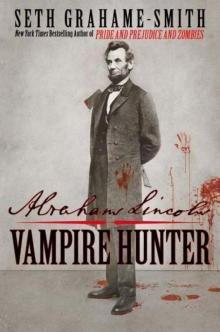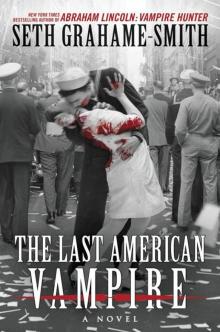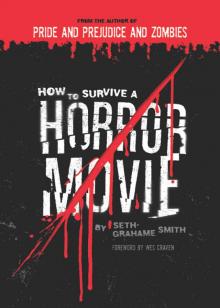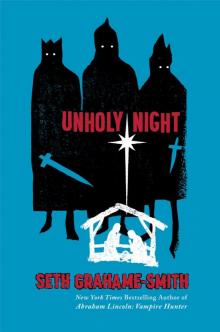- Home
- Seth Grahame-Smith
Unholy Night Page 8
Unholy Night Read online
Page 8
In fact, the men who returned to the cell, the men who fit the bound and gagged prisoners with their execution hoods and led them to the chopping block, had no idea what Balthazar, Gaspar, and Melchyor looked like, because they’d been on duty for less than an hour. In the end, the real wise men had been doomed by a shift change.
In the excitement of the execution, no one had noticed that the little round Greek was no longer quite as little or round or that the tied hands of the Ethiopian called “Gaspar” were no longer the same color. Just as no one had questioned the three wise men as they’d made their way out of the dungeon in their nobleman’s robes, through the palace, and across the courtyard. The guards had dutifully opened the north gate without a second glance, and the prisoners had simply slipped into the square, where the masses were beginning to gather for the execution of the year.
They walked as slowly as they could, given the fear and excitement beating through their bodies. There was only a street and the desire to keep following it. The desire to get as far away from Herod’s Palace as they could. They continued clear across the city, until they reached the Pool of Bethesda, where the people of the surrounding suburbs bathed, and Balthazar stopped to have the biggest drink of water any human being had ever had.
The pool was adjacent to a market that ran along the north wall of the Great Temple—a collection of merchants and vendors that stretched several blocks. His thirst mercifully quenched, Balthazar finally had the wits to form another plan.
First, he put his old sleight of hand skills to use, walking from one end of the market to the other, stealing coins from the pockets of passersby and trinkets from the merchants who hadn’t yet closed up shop for the execution. He took small pieces of gold jewelry, frankincense. Things they’d be able to trade for food and favors in the coming days.
Next, he’d used some of the stolen coins to buy as much food and water as he and the others could carry. Balthazar also bought a little myrrh to dress his wounds with—a trick he’d learned from the Asian traders in the forum as a boy. A little of that stolen jewelry was used to buy a camel for each of them. Camels they rode south past the temple walls. The men had no idea where they were headed, and they didn’t care, just as long as it was far away from Jerusalem.
If Gaspar and Melchyor had harbored any doubts that their companion was, in fact, the Antioch Ghost, the chatter on the streets of Jerusalem put them to rest. The whole city seemed to be talking about the execution. The Antioch Ghost was on every tongue. Balthazar had saved these thieves’ lives, and they were in his debt. In accordance with tradition, they were his servants until that debt was repaid in kind. It was a code as old as the desert, and it applied to career criminals just as much as any other man. Even Balthazar, who never met a tradition he didn’t despise, had honored this one in the past. It wasn’t a tradition in the religious sense, like eating this animal versus that, or wearing this hat or that hat or no hat at all. It was simply common sense.
Every service had a price. Every object a value. If someone made you a sword, you paid him the appropriate amount or traded something of equal value with him. If a man saved your life, you either paid him the amount you considered that life worth, or you saved his in return. Until either of those things was transacted, you were in his debt. It was business. And if Balthazar believed in anything with religious fervor, it was that.
Everything had a price. And though he didn’t yet know that his freedom had cost the wise men their heads, Balthazar knew he’d just upped the price on his.
III
Screaming echoed through Herod’s throne room. The servants had made themselves scarce, fearful that they’d be condemned to death for some unperceivable transgression. Advisors kept to the corners of the room—away from the warm, flickering glow of the torches, away from the cooler moonlight that streamed in through the windows with unusual intensity. They cowered in the shadows, even hid behind the rows of columns that ran along either wall.
The king paced in front of the steps of his throne, his body hunched forward. Three Judean generals stood before him, their helmets tucked beneath their arms and their tails between their legs.
“I don’t care if you have to burn this entire city to the ground to find him! I won’t be made a fool of by a common thief!”
His already raspy voice had been strained to its limits. He’d spent the last hour cursing anyone who dared to come into his field of view. Demanding the heads of everyone who’d played even the slightest role in his humiliation: the dungeon guards, the north gate guards, even the executioner. All dead.
“I want every legion, every last man, every horse, and every sword hunting him down, and I want him brought to me alive!”
Even his beloved son, Antipas, had disappeared in the wake of this disaster. He knew better than to put himself in the path of his father’s rage.
“And if a word—if one WORD—of this is spoken outside these walls, I’ll have all of you and your families put to death! None of your men are to know who they seek! As far as they and all of Judea are concerned, the Antioch Ghost is dead! Do you understand?”
The three generals all nodded. Even a simple “yes, Your Highness” could be misinterpreted in this situation.
“Good…now go find him.”
The generals bowed to their king, turned on their heels, and marched away as quickly as they could without betraying their fear. As they did, a timid face emerged from the shadows beside Herod’s throne. It belonged to an advisor—a beardless man with short graying hair and a tall, wiry build. He’d been waiting for a lull in the tirade, waiting for the right moment to deliver the news. The worst possible news. The advisor knew there was a very real chance he would be put to death just for being the bearer of what he had to say. But someone had to do it. The king had to know. Tonight, of all nights…
“Mighty Herod,” he said.
The king spun around and found him already in a deep, apologetic bow.
“What?”
“Mighty Herod, I…I must inform you of—”
The advisor had come out of his bow and met Herod’s eyes. Those horrible, yellowed eyes cutting through him. The advisor suddenly realized that he’d lost all power of speech.
“Of WHAT?”
“I…it is my sad duty to…”
“Use your tongue or I’ll have it cut out of your mouth!”
The advisor gave up all hope of getting the words out and simply pointed to the east wall. Herod’s yellowed eyes traced the path of his arm.
“What?” he asked. “What would you have me look at? All I see are my columns and the spineless nobles hiding behind them.”
“Perhaps…if Your Highness would condescend to look out one of the windows…”
Herod was tired. He was tired, and he wanted this wretched day to be over. Whatever this idiot was trying to tell him, it couldn’t be any worse than the humiliation he’d suffered earlier. He dragged his tired feet across the stone floor, toward the eastern wall.
Realizing that the king would see them if they stayed put, the advisors, wise men, and courtiers who’d been hiding behind the columns shuffled toward the rear of the throne room. They retreated as quietly as they could as the king neared—but not quietly enough to escape his attention. Did they think he was deaf? Blind? Did they think a great king held on to his throne for thirty years by being a fool?
Herod was struck by a wonderful vision as he passed the columns and neared the east wall. A vision of a world in which he was the sole inhabitant. A world with no outlaws to chase. No duplicitous courtiers or inept generals, no diseased whores or beautiful, covetous sons. A world with no fools to suffer. Perhaps that’s what heaven would be like when he arrived. A whole world for himself. A world to build in his own image. It was a nice thought.
On reaching one of the windows behind the columns and looking out, Herod understood why it had been so hard for the advisor to tell him. He also knew his long night was only beginning. His breath was taken away by wha
t he saw, even in the instant before he’d fully comprehended what it meant. For there, in the eastern sky beyond the silhouette of the Great Temple, was a star brighter than any star he’d ever seen.
“The prophecies, Your Highness.”
The advisor was cowering behind him. Waiting for the outburst he knew would come. But Herod felt no scream crawling up his throat. No rage climbing up his crooked spine. He was almost…amused by it all. Earlier in the day, he’d had the Antioch Ghost in his dungeon. Now, only a few hours later, the Ghost was a free man, and—if one believed in ancient prophecies—the heavens had just signaled the arrival of the man who would topple all the kingdoms of the world, including Herod’s.
Perhaps it was the soreness in his throat. Perhaps it was just the fact that he was exhausted. But when Herod next spoke, he did so with a soft, almost affectionate voice.
“Call the generals back in, please.”
The Antioch Ghost would have to wait. He had bigger problems.
IV
They’d been arguing about what it was. A comet? A fire burning on a clouded hillside? Was it, as Melchyor feared, the all-seeing eye of Herod himself, looking down on them? Whatever it was, it was bright. A small sun, hanging low in the sky to their left, washing out all the other fires in the heavens as they rode south.
The wise men needed a place to stop and rest for a couple of hours. None of them had slept more than a minute or two the night before, and they had a journey of untold length and hardship ahead. It couldn’t be Jerusalem. Not with Herod’s men kicking down every door in the city looking for them. And it couldn’t be the desert, either. Not with that thing up there—that nighttime sun, taking away the biggest advantage the desert had to offer: vast expanses of total darkness in which to disappear.
Unless they were willing to ride for another two or three hours, that left them with very few options. Namely, one of the villages on the outskirts of the city. Balthazar wasn’t about to go north to Bethel—not after the lack of hospitality they’d shown him during his last visit. Herodium was too far. And it had Herod in its name, which, even to a man of few superstitions, seemed like a bad idea.
That left Bethlehem.
It was a shepherd’s village. That meant there’d be stables to hide in. More importantly, stables to hide their camels in. They couldn’t have them tied up in plain sight—not in a village where the only animals were goats. Three camels would seem out of place to all but the most dim-witted soldier. Especially one looking for three escaped criminals.
On the northernmost edge of Bethlehem, before the village organized itself into a series of cobblestoned streets and evenly divided lots, the wise men came upon a cluster of small, brick homes on their right, each with a wooden stable beside it. The largest of these stables looked just about big enough for three men and their camels to squeeze into for a couple of hours. It was also the farthest from the main road, making it that much more appealing.
“Don’t you think we should keep going awhile?” asked Gaspar. “See if there’s something better in the center of the village?”
Balthazar looked down the road into Bethlehem. Other than a few small fires, the village was sound asleep. The streets all but empty. Every rooftop, every cobblestone was clearly visible in the light of that strange star. It wouldn’t be hard to spot three men on camelback. They could spend another hour looking around for something better with that thing shining down on them, or they could grab a couple of hours of sleep now.
Balthazar regretted his choice almost immediately.
It had begun the moment the wise men had poked their heads into the stable and surprised the breastfeeding girl. With her scream still ringing in their ears, the carpenter had come out of nowhere and tried to stab them with a pitchfork. Balthazar had, naturally, responded by grabbing the carpenter’s throat and punching him in the face—blackening his right eye and bloodying his nose. Seeing this, the girl had screamed some more, the baby had started crying, the camels had reared up, and Balthazar’s head had begun to throb all over again.
Now the carpenter was struggling to stay on his feet, clutching the pitchfork with his right hand and pinching his gushing nose shut with his left. The girl was trying to steady him while keeping her eyes fixed on the intruders and holding on to her crying baby at the same time. Balthazar took a step toward them with his palms held out in a nonthreatening posture, the way one might try to calm a spooked animal, but the carpenter responded by thrusting his pitchfork again, nearly connecting with Balthazar’s face. Under normal circumstances, this would have cost the carpenter his life. But Balthazar didn’t have a sword, and he couldn’t risk extending this racket and drawing unwanted attention. He needed peace, and he needed it now.
“Easy,” said Balthazar. “Everybody just…calm down.”
He backed away, his palms still held out, and motioned to his fellow wise men to do the same. The girl stopped shouting. The baby stopped screaming. Balthazar would’ve thought the latter strange, but he was too tired to notice.
“Good,” he said. “Now, what’s your name?”
The carpenter glared back at him for what seemed an eternity—his chest heaving, blood already beginning to dry on his lips and chin. Just when Balthazar was beginning to think he would never answer, the carpenter said, “Joseph.”
“Joseph, good. Nice to meet you, Joseph. And her?”
“My wife,” he said after another pause. “Mary.”
“Good. Joseph? Mary? My name is Balthazar. This is Gaspar…this is Melchyor. We don’t want to hurt you…we’re just looking for a place to rest. But, Joseph? If you don’t put that pitchfork down, I’m going to take it from you and stab you to death in front of your wife and child. Do you understand?”
Balthazar watched the carpenter think it over for what seemed an eternity. Hard, isn’t it? If you give up the pitchfork, you’ll be defenseless. If you don’t, you might have to kill all three of us. So…what’ll it be? As if answering Balthazar’s thoughts, the carpenter threw the pitchfork to the ground. Gaspar was quick to make a move for it, but Balthazar held his hand out and stopped him. He needed peace.
“Good,” said Balthazar. “Now, let’s all sit and talk for a minute.”
The wise men tied their camels up, sat in the hay, and leaned their weary bodies against the stalls. Joseph and Mary sat, too, keeping to the opposite side of the stable, which was a scant ten feet away. Mary held the baby close to her body, still reeling from the shock of seeing her husband beaten and the embarrassment of being seen in such a private, indecent state. Joseph sat beside her, still pinching his nose shut.
“What business,” asked Mary after an extended silence, “do three men have barging into someone else’s stable in the middle of the night?”
“Your stable?” asked Gaspar.
“Our stable. We were here first,” said Mary.
“We just need a place to rest our heads for a little while,” said Balthazar.
“Well you can rest them somewhere else,” she said.
“Afraid we can’t.”
Mary looked them over. Their robes were among the more expensive she’d seen. They were adorned with gold jewelry, and she could smell the frankincense they were carrying.
“You’re obviously noblemen,” she said. “Go and force one of the shepherds from their homes. Better yet, go to Jerusalem and force one of the other nobles out of theirs.”
“Our situation is…complicated,” said Balthazar.
“He’s the Antioch Ghost,” said Melchyor.
Balthazar had to suppress the urge to break the little Greek’s jaw. How could anyone be so stupid? Here they were, in disguise and running for their lives, and he casually offers up the one piece of information that could get them all killed faster than any other. Now, the moment they fell asleep, the Jews sitting across from them would go running to the nearest soldier and give them up. Sell them out for whatever reward Herod was offering. Now he’d have to tie their wrists. Gag them.
&nb
sp; There was no going back now. It was out in the open. Balthazar waited for the familiar wide-eyed reverence to wash over their faces…and waited, until it became clear that Joseph and Mary had no idea who or what the Antioch Ghost was.
This aggravated him even more. Everything aggravated him: his aching head, his weary body, the bleating of goats in the stalls behind them—everything.
“I go here and there,” he said at last, “taking what I can from the Romans and those who serve them, then disappearing. Some people have taken to calling me ‘the Antioch Ghost.’”
“So…you’re a thief,” said Mary.
“Not just a thief,” said Gaspar. “The best thief who ever lived.”
Balthazar allowed himself a private swell of pride. Obviously there was no way to know if he was “the best thief who ever lived.” But at the same time, there was no way to prove he wasn’t. Either way, it was nice to be recognized.
“Whether he’s the best or not doesn’t matter,” said Joseph through a pinched nose. “Stealing is a sin.”
“Really?” asked Balthazar. “And trying to kill three unarmed men with a pitchfork—is that a sin?”
Joseph looked at the weapon in Gaspar’s hand. Before tonight, he’d never so much as raised a fist in anger. It wasn’t in his nature. He looked away, suddenly frightened by how close he’d come to committing the sin of murder.
“I thought you were Herod’s men.”
Balthazar and Gaspar exchanged a look. They could’ve almost laughed at the irony of anyone thinking they were Herod’s men were it not for the chill they both felt down their backs. What did they know?

 PRIDE AND PREJUDICE AND ZOMBIES
PRIDE AND PREJUDICE AND ZOMBIES Abraham Lincoln: Vampire Hunter
Abraham Lincoln: Vampire Hunter The Last American Vampire
The Last American Vampire How to Survive a Horror Movie
How to Survive a Horror Movie Unholy Night
Unholy Night